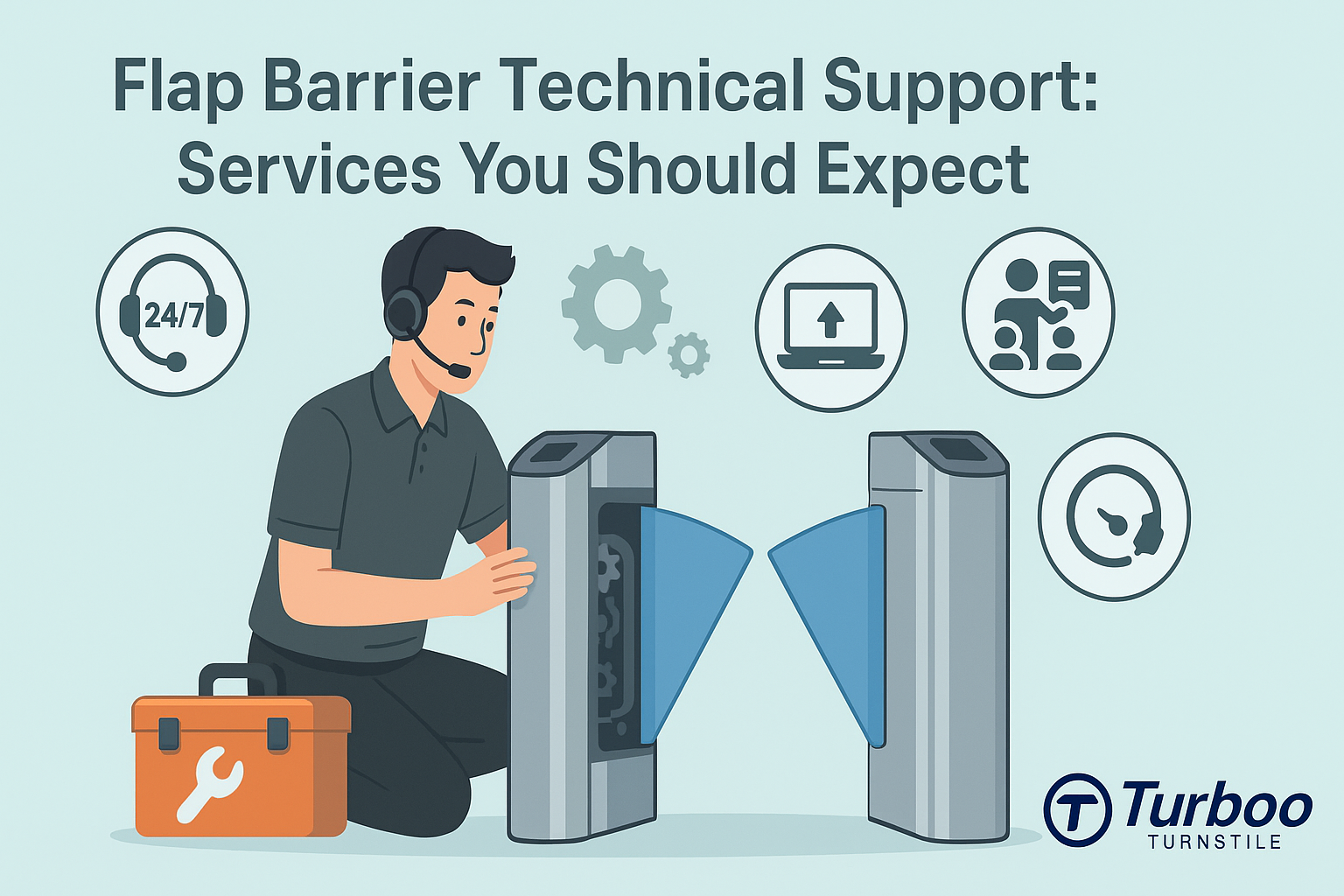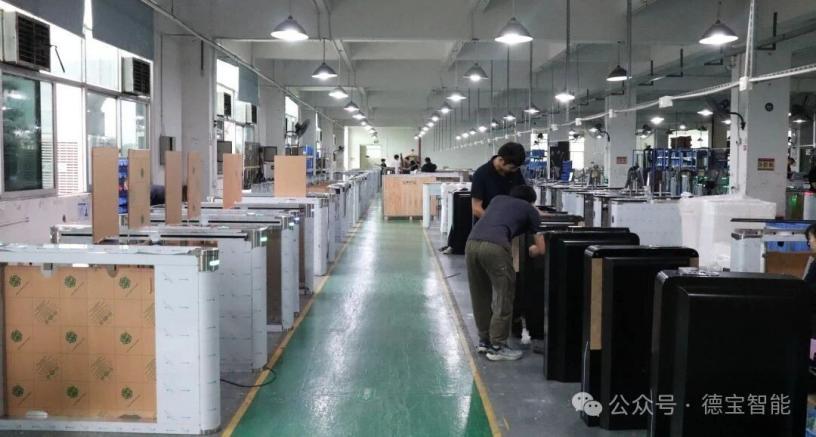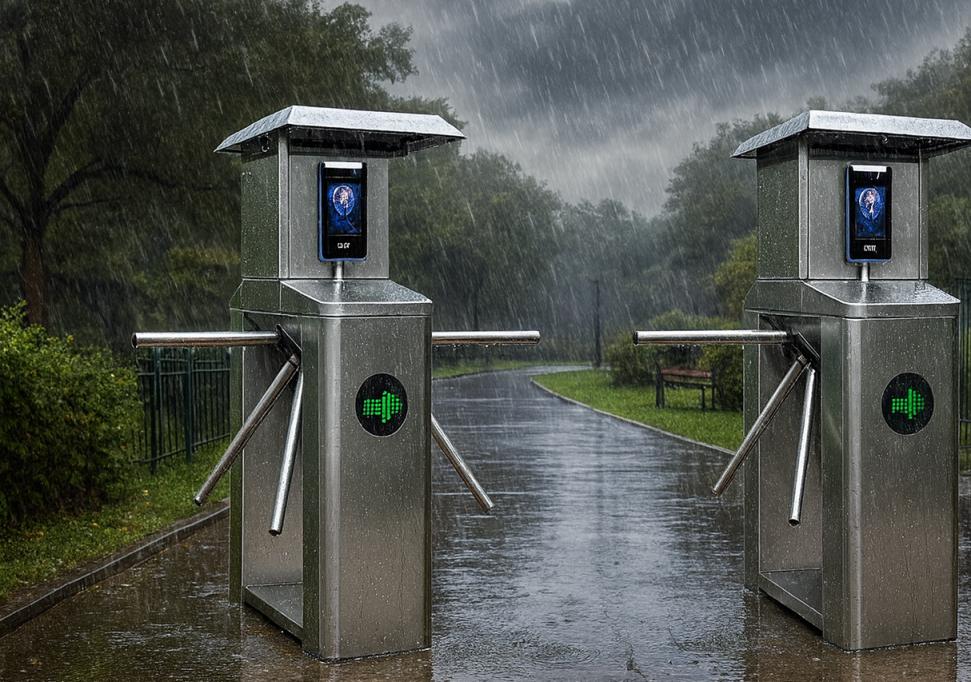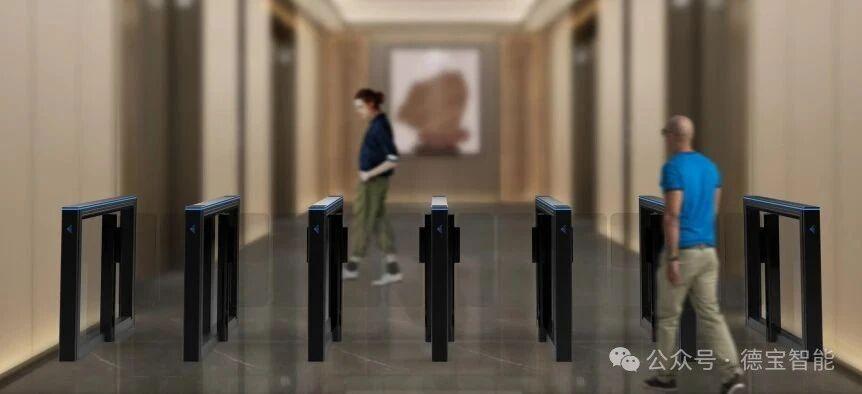Flap Barrier Technical Support: Services You Should Expect


Imagine a busy facility where access points are controlled by flap barriers. These barriers serve as crucial components of the building’s security system, preventing unauthorized access while allowing seamless passage for authorized individuals. But what happens when one of these barriers malfunctions? Facility teams often find themselves scrambling to solve the issue, especially when immediate solutions aren’t available, leading to delays and frustration. The bottom line? Reliable flap barrier support is vital for keeping daily operations running smoothly.
Technical support for flap barriers goes beyond the simple “fix it when it breaks” approach. It encompasses a variety of services that can significantly reduce downtime, improve system performance, and enhance security operations. Good technical support involves more than just troubleshooting over the phone; it includes preventive measures, remote diagnostics, and timely on-site repairs, all aimed at ensuring your flap barriers function seamlessly.
This guide will take you through the essential services you should expect from your flap barrier vendor’s technical support. By understanding what support processes are in place, you can take proactive steps to ensure your security systems are always up and running. From phone support to preventive maintenance, let’s explore the full range of services that should be part of your flap barrier support package.
Types of Technical Support
When it comes to flap barrier support, there are different types of assistance you can expect from your vendor. Understanding these support channels can help you assess the responsiveness and effectiveness of your flap barrier service team. Let’s look at the primary forms of support: phone support, email assistance, remote diagnostics, and on-site repair.
Phone Support
Phone support is typically the first point of contact when a technical issue arises. It’s fast and allows for direct communication with a trained technician who can help diagnose the issue. Good phone support involves knowledgeable engineers who can identify problems quickly and provide effective solutions. In many cases, the issue can be resolved over the phone, minimizing downtime.
When you call for flap barrier support, you should expect the technician to:
- Answer your call within minutes, especially during peak working hours.
- Provide clear instructions to help you solve common problems.
- Offer follow-up support if the issue isn’t resolved in the first call.
If the problem is more complex and requires additional expertise, the technician should escalate the issue promptly to senior engineers or schedule a follow-up for further assistance.
Email Assistance
Email support is useful for non-urgent issues or when you need written confirmation of guidance for troubleshooting or software-related questions. While not as immediate as phone support, email provides a record of communication, which is helpful for documenting issues and solutions for future reference.
Key benefits of email support include:
- Clear, written instructions that you can refer back to.
- The ability to send photos or documents to assist the support team in diagnosing the issue.
- A slower but still effective solution for issues that don’t require immediate action.
Remote Diagnostics
With the advancement of technology, many flap barrier systems are equipped with software that enables remote diagnostics. This feature allows your vendor’s support team to access the system remotely, analyze performance data, and identify potential problems without needing to visit the site physically. Remote diagnostics saves time and resources and can solve issues faster, especially when they are related to the system’s configuration or software.
Expect the following from remote diagnostics:
- Quick response times to assess system health.
- Real-time troubleshooting without waiting for on-site visits.
- Reduced downtime and more efficient resolution of software or firmware issues.
On-Site Support and Repair
In cases where remote diagnostics or phone support can’t resolve the problem, on-site support becomes necessary. A technician will visit your facility to inspect the flap barrier, identify the root cause of the problem, and make the necessary repairs. This level of service is essential for hardware failures, mechanical issues, or complex system malfunctions that can’t be fixed remotely.
When on-site support is needed, the vendor should:
- Schedule the visit promptly, minimizing disruption to your operations.
- Arrive with the necessary tools and replacement parts to perform repairs.
- Offer a clear estimate of repair times and costs.
Service Response Times
The speed at which you receive technical support can significantly impact your facility’s security and operations. Service response times vary depending on the severity of the issue and the support package you’ve selected, but prompt response should always be a priority.
Importance of Fast Response Times
The longer a flap barrier remains non-operational, the greater the risk to facility security. Unauthorized individuals may gain access, or authorized personnel may be delayed, which can affect productivity and safety. A reliable vendor should have response time goals for phone, email, and on-site support. Ideally, a phone support engineer should be available within minutes, and on-site technicians should be able to arrive within a few hours for critical issues.
Many vendors offer service-level agreements (SLAs) that define expected response times. Be sure to ask your vendor about their SLAs and what they commit to for different types of issues. It’s also important to clarify whether these response times apply during both regular business hours and after-hours, as security systems need to be operational at all times.
Preventive Maintenance and Health Checks
Preventive maintenance is one of the most effective ways to keep flap barriers in good working condition and reduce the likelihood of unexpected breakdowns. This type of service is proactive rather than reactive, meaning your vendor will routinely check your barriers to identify potential issues before they become significant problems.
Key Preventive Maintenance Activities
Good flap barrier support includes regular preventive maintenance visits where technicians will:
- Inspect the mechanical components for wear and tear.
- Clean and lubricate moving parts to ensure smooth operation.
- Check the software and firmware to ensure everything is up-to-date.
- Verify the alignment and calibration of sensors to prevent misreads.
By scheduling regular maintenance, you not only increase the lifespan of your flap barriers but also reduce the frequency of emergency repairs, saving both time and money in the long run.
Software and Firmware Updates Assistance
Modern flap barriers often rely on software and firmware to control access and integrate with other security systems. As with any technology, these systems require regular updates to improve performance, security, and functionality. Your vendor should provide support for software and firmware updates to ensure that your barriers are always operating with the latest enhancements.
Why Software and Firmware Updates Matter
Failure to update software can lead to security vulnerabilities, system inefficiencies, or incompatibilities with newer technology. A vendor that offers software and firmware update assistance will keep your system up-to-date and secure by:
- Providing timely notifications of available updates.
- Offering remote assistance or guidance for implementing updates.
- Ensuring that updates are compatible with your existing system components.
Training Services for Facility Staff
Effective flap barrier operation isn’t just about having the right hardware and software; it’s also about having a team that understands how to use and troubleshoot the system. Training services provided by your flap barrier vendor can empower your staff to handle minor issues themselves, improving overall efficiency and reducing dependency on technical support.
What Training Services Should Include
A good training program should include:
- Instruction on basic system functions and controls.
- Troubleshooting common issues, such as resetting barriers or recalibrating sensors.
- Best practices for maintaining the system and ensuring optimal performance.
By investing in staff training, you can enhance security and minimize operational disruptions.
Clear Escalation Processes
In a busy facility, the need for clear escalation processes is vital. If initial attempts at resolving an issue don’t succeed, a smooth transition to more advanced support is essential to ensure swift resolution. This is especially true for complex or rare issues that require expertise beyond the first-line support team.
Why Escalation Matters
When a flap barrier issue goes unresolved at the first point of contact, having an established escalation process is crucial. A good vendor will provide clear steps for escalating issues, whether it’s from a phone support technician to a specialized engineer or from email support to an on-site visit. Effective escalation can minimize downtime and ensure that the problem is handled by the most qualified individual or team, leading to faster resolution and less disruption to security operations.
What you should expect:
- A structured escalation plan with clear timelines for resolution.
- Prompt access to higher-level engineers if necessary.
- Transparent communication about the status of the issue and estimated resolution time.
Ongoing System Health Checks
While preventive maintenance addresses common wear-and-tear issues, ongoing system health checks are about monitoring the system’s performance and identifying subtle, underlying problems that might not be immediately visible. Regular health checks can help keep your flap barriers functioning optimally for a longer time, avoiding sudden failures that could disrupt facility operations.
What Ongoing System Health Checks Involve
Ongoing system health checks typically involve:
- Monitoring system logs for unusual behavior or errors.
- Running diagnostic tests to check the overall functionality of the barriers.
- Assessing the integration of the flap barriers with other security systems like access control, CCTV, and alarms.
- Reviewing system performance reports to ensure everything is running at full capacity.
Your vendor should provide these services periodically, ensuring that your barriers are always working at peak performance and preventing costly repairs down the line.
How Reliable Flap Barrier Support Protects Your Investment
Investing in flap barriers is a significant decision for any facility manager. These systems are integral to maintaining security and ensuring that access points are efficiently managed. However, without proper support, even the best systems can experience downtime and malfunctions. Reliable flap barrier support ensures that your investment remains protected by extending the lifespan of the barriers, reducing the need for expensive emergency repairs, and minimizing downtime.
Protecting Your Facility’s Security
A well-maintained flap barrier system ensures that your facility’s security is never compromised. When the barriers are functioning as intended, only authorized individuals can enter, reducing the risk of unauthorized access. This, in turn, enhances the overall safety of your facility.
Support helps protect your investment in the following ways:
- Minimizing operational disruptions: A reliable support system ensures your barriers are continuously functional, limiting disruptions in access control and security.
- Extending system lifespan: Regular maintenance and timely repairs reduce the wear on the barriers, thus prolonging their useful life.
- Securing long-term investment: With the right support, your security system remains relevant and effective, protecting the funds invested in infrastructure and technology.
Having a vendor that supports your flap barriers with preventive services and quick fixes when necessary helps ensure you don’t face unexpected breakdowns or costly repairs. This creates confidence in your security systems, providing peace of mind for both facility managers and security staff.
Enhancing User Trust in Facility Security Systems
Flap barriers serve as a critical component in ensuring the safety of both personnel and property. If your barriers malfunction frequently, trust in the security system can quickly diminish. Regular, reliable technical support fosters confidence not only within your team but also among the people using the system daily.
Why User Trust Matters
A well-functioning access control system assures users that their security is taken seriously, whether it’s employees, guests, or other stakeholders. Knowing that there’s robust support in place for immediate assistance in case of an issue can improve user trust and morale.
By ensuring that your barriers are regularly maintained and promptly fixed when needed, you can keep security operations running smoothly and maintain a trustworthy security system.
Conclusion
Reliable flap barrier support is more than just emergency fixes – it’s about ensuring your access control systems are always functioning smoothly and effectively. By understanding what services to expect from your vendor’s technical support team, you can avoid costly downtime, protect your investment, and enhance overall system performance. Remember, support isn’t just a luxury but a necessity to keep your facility’s security intact.
When choosing a flap barrier vendor, look for one that offers comprehensive support, from phone and email assistance to remote diagnostics and on-site repairs. Make sure to inquire about their preventive maintenance services, response times, and escalation processes. Ultimately, investing in reliable support not only enhances the functionality of your flap barriers but also contributes to long-term operational efficiency and user trust.
FAQs
1. What are the most common flap barrier issues that require technical support?
Common issues include malfunctioning sensors, software glitches, misalignment of mechanical components, or failure to respond to authorized access. Regular maintenance and prompt support can help resolve these problems quickly.
2. How often should I schedule preventive maintenance for my flap barriers?
It’s recommended to schedule preventive maintenance at least once or twice a year, depending on usage. However, high-traffic facilities may need more frequent checks.
3. Can I handle minor flap barrier issues without external support?
Yes, many minor issues, such as resetting the system or recalibrating sensors, can be handled by trained staff. Vendors often provide training to help staff troubleshoot common problems.
4. How do I know if my flap barrier vendor offers remote diagnostics?
Ask your vendor whether they provide remote diagnostics services. This usually requires specific software or network access, which allows the support team to monitor and troubleshoot the system without needing an on-site visit.
5. What’s the average response time for flap barrier technical support?
Response times vary depending on the support package, but high-quality vendors typically offer a response time of less than an hour for phone support and a few hours for on-site visits in case of critical issues.












